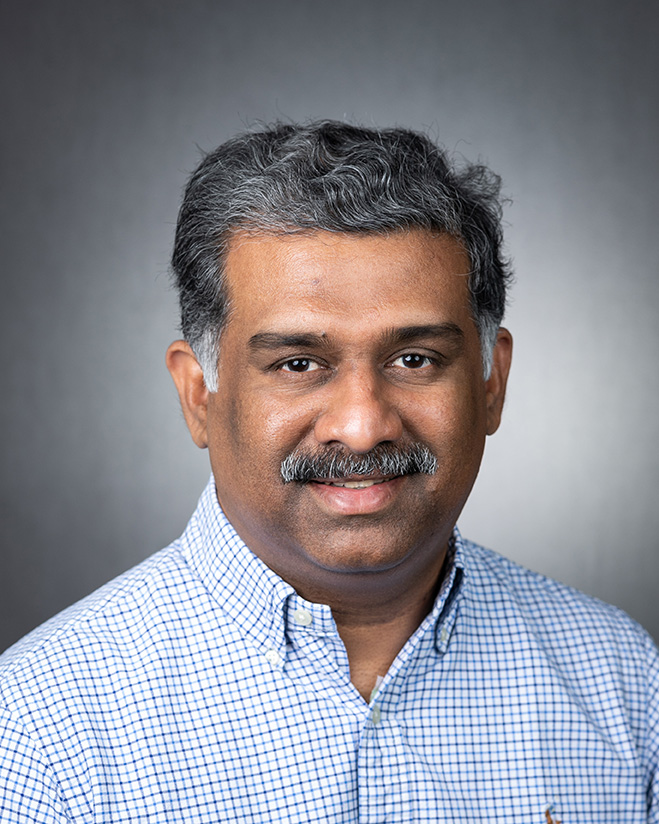, Public Relations Specialist, UF/IFAS Communications Service
Mathews Paret, Vegetable Pathologist, North Florida Research and Education Center-Quincy, and professor in the UF/IFAS Plant Pathology Department, will step into the role of department chair starting September 15, 2023. Paret will lead the department of more than 30 faculty members based on the University of Florida’s Gainesville campus and at research and education centers around the state. Plant pathologists work on the front lines of emerging and economically important diseases that impact crop production and farmers’ livelihoods.

Mathews Paret. Photo by Cristina Carriz.
“The opportunity to work with highly talented UF/IFAS plant pathologists located through the state of Florida, and help support their research, teaching, and Extension programs, and their professional and personal growth for continued success is the most exciting aspect about this new role,” Paret said.
Paret is currently based at the UF/IFAS North Florida Research and Education Center in Quincy, Florida, where he directs the center’s Plant Disease Diagnostic Clinic. Paret worked closely with Florida growers to combat plant diseases affecting the state’s vegetable, ornamental, fruit and other specialty crops.
Paret serves as core faculty with the UF/IFAS Global Food Systems Institute and conducts international programs in West Africa and Asia to establish integrated pest management centers to improve the livelihoods of farmers in those parts of the world.
In addition to his leadership roles, Paret is an accomplished scientist, Extension professional, and educator. This experience in all three branches of the land grant mission has informed his vision for the department he will lead.
“Establishing our department as the most visible global leader in research, teaching and Extension on pathogens affecting sub-tropical and tropical crops is of high priority. Empowering students with a broad set of skills including professional and personal development opportunities, and enhanced opportunities for distance education is another major goal. Enhanced engagements with other UF/IFAS departments, research and education centers, county Extension, other universities, federal and state agencies, private industry and many other institutions will be critical,” Paret said.
“Finally, central to my vision for the department is a strong engagement approach that actively supports the needs of our stakeholders in Florida, nationally and internationally. I would like to welcome everyone to connect with our department,” Paret added.
Paret’s research accomplishments include the development of nanomaterials to fight bacteria and viruses that affect plant health as well as the creation of diagnostic techniques that can be used in the field to detect new plant pathogens. These diagnostic techniques were instrumental in the preventing rose rosette disease from establishing in Florida. Paret’s disease management programs have been adopted by watermelon, tomato and carrot producers in Florida and elsewhere. In addition, Paret has advised the work of numerous doctoral, masters and undergraduate students over the years who have gone on to make valuable contributions to the field of plant pathology.
“Dr. Paret has impressed me not only with his groundbreaking research but with his pursuit of multidisciplinary collaborators, his devotion to students and his direct service to stakeholders through extension,” said Scott Angle, UF senior vice president for agriculture and natural resources. “His appointment is good news for the students, staff, faculty and stakeholders he’ll support.”
Paret holds a bachelor’s degree in agriculture and a master’s degree in horticulture from Allahabad Agricultural Institute in India. While in India, he studied bacterial wilt of edible ginger, and his fascination with the causes and management of the economically important disease led him to the field of plant pathology. Paret went on to earn a doctorate in tropical plant pathology from the University of Hawaii at Manoa, and then came to the University of Florida as a postdoctoral research fellow in plant pathology at the North Florida REC in Quincy. He has since risen through the ranks to become a full professor this year.
- Mathews Paret Promoted to University of Florida Plant Pathology Department Chair - July 28, 2023
- Field Performance of Plant Protectants against Bacterial Leaf Spot on Watermelon - February 11, 2022
- Using Scouting and Diagnostic Confirmation to Improve Watermelon Spray Programs in North Florida - September 25, 2020
